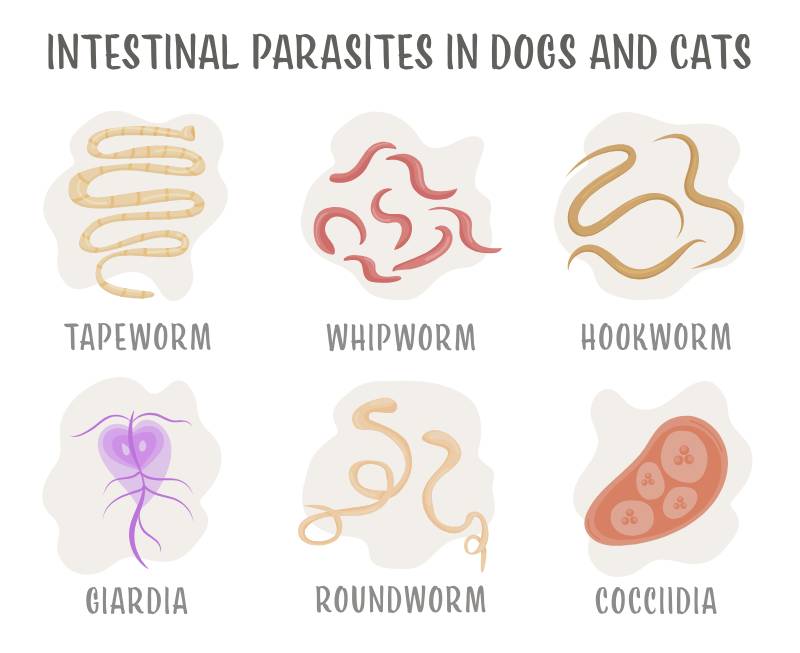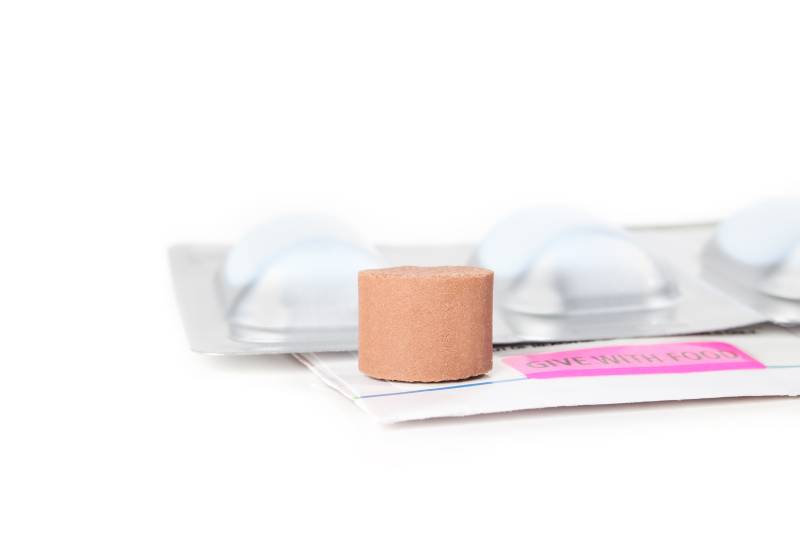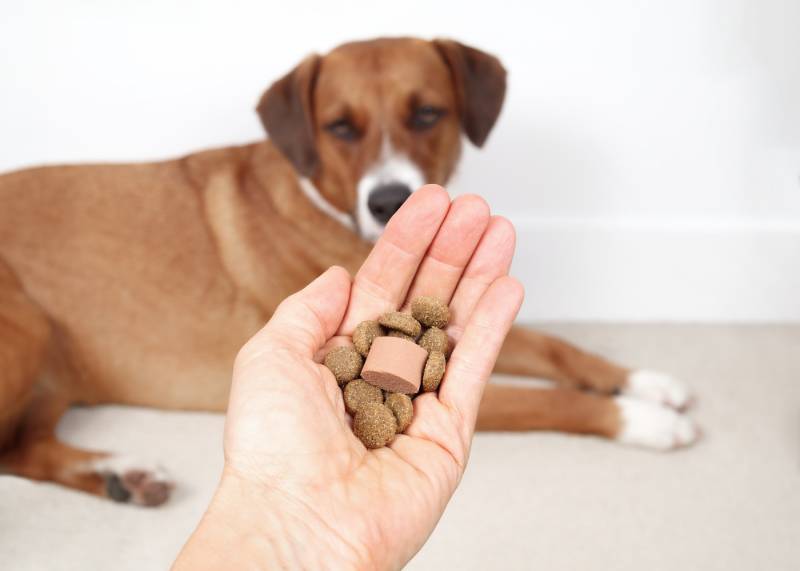Gastrointestinal parasites commonly infect our four-legged companions. Whipworms are one of the more challenging parasites to rid dogs of due to their long life cycle. General debilitation, weight loss, and diarrhea are just a few signs a dog with a whipworm infection may have. Continue reading below to learn more about whipworms in dogs.

What Is a Whipworm?
Trichuris vulpis, the common canine whipworm, is a macroscopic gastrointestinal parasite. It is smaller than most gastrointestinal worms, maxing out at 2 inches long. There are several species of whipworms, but Trichuris vulpis is the species that impacts dogs. Dogs can come into contact with this worm through environmental contamination. The parasite’s life cycle is long, making it more challenging to diagnose an infection and more difficult to rid the body of whipworms.
Dogs become infected with whipworms when an infectious egg is consumed in the environment. This can happen through coprophagia or the consumption of feces. This isn’t the only way this occurs, and dogs commonly consume the infectious egg from contaminated soil or water. Once the canine has ingested the mature egg, the larval stage is released in the small intestines.
From there, the worm seeks refuge in local glands, where maturation continues for a week. Once the larval stage matures into the adult stage, the worm finds its way into the cecum and large intestines, where it buries its head into the lining of the intestines and consumes the host’s blood. After making a home in the large intestines, the worm will fully mature and release eggs several weeks after the infective stage is consumed. The worm releases eggs into the intestines, which are then passed in the stool and deposited in the environment.
Fresh feces are not infective since the larva must mature in the egg before becoming infective, and this process can take weeks to complete. Additionally, a whipworm egg is very hearty and can survive in the environment for years.

What Are the Signs of a Whipworm Infection?
The signs of a whipworm infection can vary. Some patients may not exhibit any clinical signs suggesting infection. Those with a heavy worm burden or those who are immune-compromised tend to have the most noticeable clinical signs. As parasitism persists, damage to the large intestines occurs, resulting in poor water absorption.
In animals with a large worm burden, inflammation within the large intestines results in common clinical signs. In severe infections, anemia or low levels of red blood cells may be noted.
- Weight loss
- Bloody diarrhea
- Lethargy
- Reduced appetite
- Dehydration
Diagnosing Whipworm Infections
Like most gastrointestinal parasite infections, fecal tests are helpful in diagnosing infection. Fecal floatation tests are often used to check for eggs within the stool through the use of a microscope.
An additional test exists to check for whipworm antigens. Due to the whipworm’s life cycle, this ELISA test may be the most helpful, as worms are not constantly shedding eggs. It takes over 10 weeks from the time a patient is infected with whipworms before the mature worm will release identifiable eggs. This means a fecal flotation test may show negative results even though an active infection occurs in the patient.

Pseudo-Addison’s Disease
Although the exact pathogenesis, or disease process, is not understood, some dogs develop abnormalities in blood work secondary to whipworm infections. Only a portion of dogs infected with whipworms exhibit these abnormalities, which can resemble those of Addison’s Disease or hypoadrenocorticism.
Dogs with this syndrome have electrolyte abnormalities identical to those of Addisonian patients and can be profoundly dehydrated. Due to the whipworm’s life cycle, routine fecal tests may not show an infection with whipworms. Testing cortisol levels is the only accurate way of differentiating an Addisonian patient from a dog with whipworms.

How to Treat Whipworm Infections
Fortunately, whipworm infections are treatable with help from your veterinarian. Due to the long life cycle of the parasite, the Companion Animal Parasite Council suggests that your pet should be dewormed monthly for 3 months. Common dewormers used to treat other parasites are not always efficacious against whipworms. Fenbendazole and Febantel are two dewormers that are effective against this parasite.
Often, veterinarians recommend switching dogs with a whipworm infection to a milbemycin or moxidectin-based heartworm preventative. Effective products include Sentinel, Advantage Multi, and Interceptor. This is helpful because the heartworm preventative is given monthly, which will continue to deworm regularly against whipworms.

Retesting
It is recommended that fecal tests be periodically rechecked after treatment. Your veterinarian will explain the retesting protocols. Retesting is crucial since treatment failures and a high rate of reinfections may occur.
How Do I Care for a Dog With Whipworms?
The best thing you can do for your dog with whipworms is to lower the chances of reinfection. This can be achieved by disposing of fecal matter promptly, as fresh stools are not infectious. Additionally, you must continue with appropriate preventative medication year-round, which may be a heartworm medication that treats whipworms. Closely observing your dog’s behavior during the treatment is recommended.

Zoonotic Potential
A zoonotic disease can be spread from an animal to a person. Although there have been reports of human infections with Trichuris vulpis, the Companion Animal Parasite Council doesn’t consider it zoonotic due to lack of evidence. Still, precautions should always be taken to minimize this chance by maintaining good hygiene, which includes thoroughly washing your hands after handling fecal matter.
Frequent Asked Questions
My Dog Was Diagnosed With Whipworms; Can This Be Passed to My Cat?
Although cats can develop whipworm infections, they are not susceptible to the canine variety Trichuris vulpis. As a result, your dog cannot pass whipworms on to your cat.
My Dog Keeps Developing Whipworms; What Can I Do?
Your veterinarian may recommend a heartworm product that is efficacious against whipworms. Several products are available, including Sentinel, Trifexis, and Advantage Multi. It is essential to clean your dog’s environment of feces as soon as possible to prevent reinfection.

In Summary
Whipworms can be stubborn parasites to eliminate. Fortunately, whipworm infections can be treated and are rarely life-threatening. Your veterinarian can provide appropriate treatment recommendations. There are preventative medications available to routinely deworm against whipworm infections. The best thing you can do for your pet if they have been diagnosed with whipworms is promptly dispose of their feces to lower the risk of reinfection.
Featured Image Credit: ALEX_UGALEK, Shutterstock











